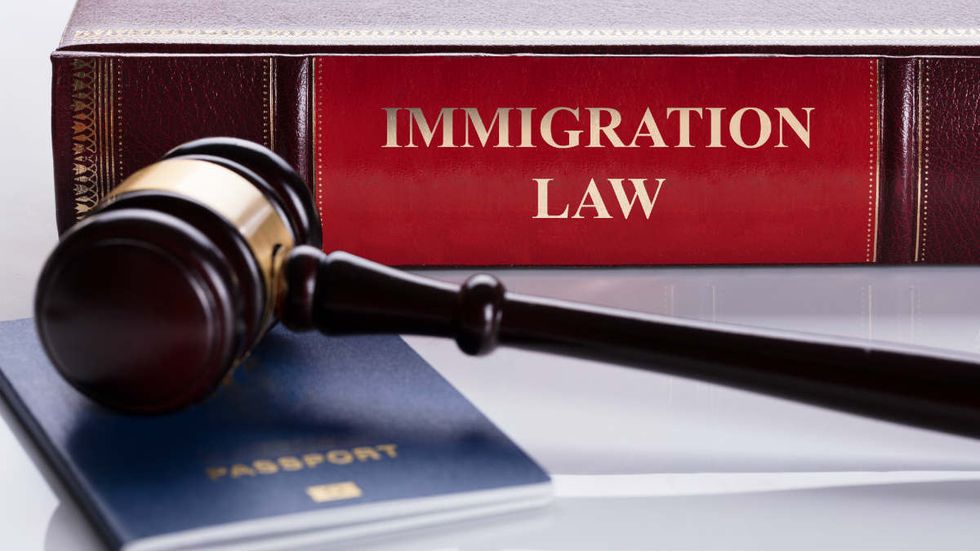
© 2024 Blaze Media LLC. All rights reserved.
Battle over the Bahamas: Whatever happens in the world, the answer is always mass migration to the US
September 10, 2019
Do the resources of the United States government exist for the benefit of Americans or for the benefit of the world? This is a simple question that needs to be answered now, because it seems that any time any event – be it weather, poverty, or war – breaks out in any part of the world, the answer is always immigration, and it’s always to be brought to just one country – the United States.
It’s very easy to flash pictures of the devastation in parts of the Bahamas and point to the need to bring them here to America. But as always, virtue-signaling is not public policy, especially when the recipients are foreign nationals and they are coming at the expense of the United States government. Nobody is asking some of the obvious questions before volunteering the American people to go along with this plan, against our immigration laws:
Are we vetting these people?
What about the public charge? Who is paying for their stay, and where would they stay? Will they receive work permits?
How can we ensure that they will not remain here indefinitely like hundreds of thousands have done since the 1990s when we began granting amnesty to people from all over the world who experienced natural disasters in their home countries?
Will we grant them birthright citizenship for their babies too?
Why aren’t other countries pitching in?
Don’t we have many other obligations and other humanitarian crises related to mass migration?
The problem with all these events is that the media and political class reset the baseline after every new natural disaster as if this is the first time we are expending taxpayer dollars on humanitarian immigration programs. The reality is that our entire immigration system is essentially a humanitarian program. We have refugees, asylum, parole, Temporary Protected Status, special juvenile immigrant visas, U visas, diversity visa lottery, and chain migration, which has essentially been used as a free pass rather than to bring people of merit to benefit the American people.
In total, we bring in 1.1 million every year, in addition to the million or so who have come to our border from Central America this year. Yet the media virtue-signalers isolate each one and make it seem as if this is the first time we are using humanitarian immigration assistance. Nobody mentions cutting previous programs to make room for new ones.
Then there is the history of past experience. While the social contract of governance dictates that our resources should only be used for our citizens, it’s understood that we as a society are OK with a certain degree of humanitarian use that doesn’t benefit America as long as it’s temporary, transparent, and doesn’t harm Americans beyond that initial cost. For example, the use of the Coast Guard to help countries ravaged by hurricanes, such as what just happened in the Bahamas, in the immediate aftermath of the hurricane. However, to not only help them there, but to bring them to Florida brings with it an entirely new set of political, financial, and legal questions that require a transparent debate.
Since the 1990s, we’ve extended Temporary Protected Status to allow those who are here on temporary visas to remain for 6-18 months if their country is hit by a natural disaster. But over the years, temporary has become permanent, and roughly 400,000 remain in this country, many of whom actually initially came here illegally, from countries that experienced natural disasters years ago. TPS for Honduras due to Hurricane Mitch in October 1998, El Salvador because of a 2001 earthquake, and Haiti because of a 2010 landslides are all perfect examples.
To play the sympathy card and squelch any debate over extending humanitarian visas to the Bahamas without providing this context is dishonest. Any betting man would say that if history is a good predictor of the future, these people will remain here indefinitely, and the program will likely allow many other people not in need to come here illegally and weasel their way into the status. Remember, not every part of the Bahamas was affected by the hurricane Are we limiting it just to those from Abaco and Grand Bahama?
Florida Sens. Marco Rubio and Rick Scott are calling for us to waive visa requirements and bring in thousands of Bahamians. But why is immigration always the first resort, and why is it always the United States?
Historically, the Bahamas belonged to Great Britain and is technically still a commonwealth. Why won’t they go to Britain or to Canada, especially if this winds up being a long-term proposition? Also, we are already doing more to help them there in the Bahamas than other countries. Furthermore, we already have Puerto Rico in the Caribbean that is our responsibility, and we’ve brought in hundreds of thousands from there, many of whom are residing in Florida as well, because of natural disasters. At some point, the rest of the world needs to share in the burden.
If the politicians feel a need to do this, why not hold a vote in Congress and do it transparently, where we can debate the merits, potential concerns, and at least enact safeguards to ensure this doesn’t go the way of every other humanitarian loophole? Our laws are very clear as to who can come to this country, and nothing in our laws explicitly gives the government power to prospectively invite a category of people to come here, circumventing the regular process. The Bahamas is not a visa waiver country. The DHS can offer parole to those who do come on a case-by-case basis, and TPS can be offered to those already here. But to prospectively invite in an entire category of people without visas and without a new statute is another example of social transformation without representation.
“Of course Americans are horrified by the destruction in the Bahamas from the hurricane and want to help,” said immigration expert Jessica Vaughan in an interview with CR. “But the kind of help most needed is donations for food, shelter, and medical care. For some politicians and activists, the only kind of assistance they can think of seems to be the immediate suspension of our immigration laws so that anyone in the afflicted area can move to the United States.”
She noted that this is similar to the “dubiously legal programs like the Haitian ‘family reunification’ program or the Central American minors ‘refugee’ program, which were made up to skirt congressional authority over admissions categories and which can do permanent damage to the fairness and integrity of our legal immigration system.” Last week on my podcast, Vaughan listed an array of ways our immigration laws have been destroyed by politicians “making the exception the rule and the rule the exception.” Add this one to the long list.
Humanitarianism is only humane when done with one’s own resources, not at the expense of others. Do the American people ever get a vote in immigration decisions made for them by yellow journalists and executive branch bureaucrats?
#mc_embed_signup{background:#fff; clear:left; font:14px}
/* Add your own MailChimp form style overrides in your site stylesheet or in this style block.
We recommend moving this block and the preceding CSS link to the HEAD of your HTML file. */
Want to leave a tip?
We answer to you. Help keep our content free of advertisers and big tech censorship by leaving a tip today.
Want to join the conversation?
Already a subscriber?
Blaze Podcast Host
Daniel Horowitz is the host of “Conservative Review with Daniel Horowitz” and a senior editor for Blaze News.
RMConservative
more stories
Sign up for the Blaze newsletter
By signing up, you agree to our Privacy Policy and Terms of Use, and agree to receive content that may sometimes include advertisements. You may opt out at any time.
© 2024 Blaze Media LLC. All rights reserved.
Get the stories that matter most delivered directly to your inbox.
By signing up, you agree to our Privacy Policy and Terms of Use, and agree to receive content that may sometimes include advertisements. You may opt out at any time.



